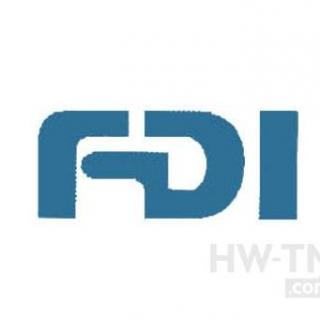
介绍:
China FDI, Outbound Investment Post Upturns
Foreign direct investment or FDI into the Chinese mainland rose nearly 2 percent in September from a year earlier, compared to a 14-percent slump seen in August.
It's seen as a sign that investors are more confident about the growth outlook in the world's second largest economy.
The FDI for the first nine months, excluding investment in the financial sector, is down 1.4 percent from the same period last year.
The service sector is continuing to attract an increasing share with a gain of over 55 percent.
FDI into the manufacturing sector in the first nine months dropped 16.5 percent year on year, accounting for a third of the total.
China is expected to attract about 120 billion dollars of FDI this year.
Bank of China prices offshore preference shares
The Bank of China has sold 6.5 billion U.S. dollars worth of offshore preference shares, the largest ever contingent capital deal in the world.
It also marks a milestone that a Chinese listed company has issued the preference shares, instruments that behave like bonds.
The yield will be put at 6.75-percent.
With the move, the bank is trying to bolster its balance sheets to meet new global bank capital rules.
Chinese banks are taking steps to replenish their balance sheets faced with slow growth and an increase in bad debts.
Since March, China's securities regulator has enforced new global capital rules which aim to ward off a financial crisis.
Tencent vs. Qihoo 360 closes
Anchor:
China's first ever lawsuit on the issue of monopolies in the Internet industry has come to an end, as the case between Tencent and Qihoo 360 closed at the China's Supreme People's Court.
The court rejected Qihoo's appeal and ordered that compensation be paid to Tencent.
For more on the case, here's CRI's Fei Fei.
Reporter:
"Based on the Anti-monopoly Law of the People's Republic of China and the Civil Procedural Law, the court rules to reject the appeal and sustain the original ruling. This is a final ruling."
The Supreme People's Court has rejected the appeal of Qihoo 360 on Tencent's market monopoly, saying "current evidence is not sufficient to prove Tencent's dominance of the market".
Qihoo was also ordered to pay 790 thousand yuan, or some 130 thousand U.S. dollars, to Tencent in legal fees.
Fan Yong is the legal director at Qihoo 360.
"We feel regret at the ruling in this case. Qihoo 360 is an innovative company and fighting against an Internet giant is a hard and new topic in both the judicial field and our industry. The four-year lawsuit has also attracted the attention of people from these areas. That also includes people from other countries. With this much attention, it is possible for us to build a good environment for innovation."
Xu Yan is deputy legal manager of Tencent.
"The ruling is very important for regulating competition in the Internet industry. Meanwhile, it will encourage and protect internet companies to grow through innovation"
Even though Tencent has taken up more than 80 percent of the market share, both in the PC-based and mobile instant messaging service markets, the nub of the court's ruling is about the definition of the market.
Wang Yong, deputy director of the Institute of Economics in Tsinghua University, explains why the court did not admit Tencent's dominance in the market.
"For example, you open five restaurants in Tsinghua University. Then your market share could be up to 90-percent here. But if we take the whole district into account, your share may fall to 30-percent. If the market further expands to the city of Beijing, you may only take some 10-percent share in it. So the range of the market would determine whether a company has dominated in the market or not."
Tencent has more than 1 billion registered users for QQ, the most popular online chatting tool in China, while Qihoo 360, a leading anti-virus software provider, has over 300 million clients.
The legal battle started four years ago, when Tencent released new anti-virus software.
Part of its functions were very similar to Qihoo's product, which then led to a drop in Qihoo's market share.
Qihoo appealed to the supreme court after losing the court bid in Guangdong.
For CRI, this is Fei Fei.
Spending lifts morale to highest
China's bank cardholders' sentiment rebounded last month to the highest level this year as consumers spent robustly ahead of the seven-day National Day holiday.
The Bankcard Consumer Confidence Index added some 2 points from a month ago to 85.79 in September, after falling to a record low in almost two years in August.
Spending at supermarkets gained 2 percent, sharply lower than the 20 percent monthly growth in the same month last year.
BYD's fully electric taxis put into service in Brussels
34-fully electric taxis produced in China are now on the road in Brussels, Belgium.
The taxis have been produced by Shenzhen-based electric car-maker BYD.
Officials in Brussels say the e6 model fits the lifestyle of Brussels, as it generates zero emissions and is far less noisy than conventional vehicles.
BYD's e6 is a five-passenger, crossover vehicle powered by BYD batteries.
Along with its pure electric taxis, BYD is also introducing a range of electric buses into several major global cities.
大家还在听

